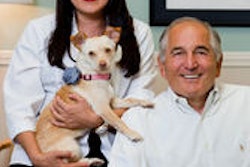
"Grow old along with me! The best is yet to be ..."
That old Robert Browning verse ran through my head recently, and I realized that the poet probably didn't need to contend with the indignities of modern healthcare. Not that I'm complaining, but I thought it would be a few more years before it all caught up with me -- dozens of doctors' visits with various family members, and then my own issues, culminating with heart surgery.
And now this: My body propped in a very vulnerable position at the office of a colorectal surgeon. "Take a deep breath and try to relax," he said, and I think it was about at that point (I'm a bit fuzzy on the details) when the question hit me: How the heck did dentists become the metaphorical embodiment of all things evil?
We're all good sports, right? Perhaps we should take it in stride. Develop a thicker skin, the way any privileged group should graciously accept the protests of the disenfranchised and oppressed. The loathing of dentistry has a proud tradition, especially in the cinema, where dentists have seldom been portrayed sympathetically, from W.C. Field's 1932 classic "The Dentist" to Corbin Bernsen's 1996 movie of the same name. We should just man up, right?
Well, calm composure was the victim recently when an urgent ADA eGRAM slid quietly into my inbox. ADA President Ron Tankersley, D.D.S., (now past president) was calling out the troops to protest an unfair characterization of dentists as exploitive, selfish, manipulative, and greedy. It happened during an October 5 broadcast on the National Public Radio (NPR) "All Things Considered" program, when Dan Ariely, Ph.D., a professor of psychology at Duke University with some pretty impressive credentials, indulged in what I'm guessing was a primal catharsis of his own issues with the dental profession. The tone was light and punctuated by the somewhat nervous giggling of host Robert Siegel -- the repartee was falling a bit flat, so I'm unsure whether his intent was to set his guest at ease or in anticipation of the torrent of e-mails that surely was to follow.
And follow it did. There were so many angry posts to the NPR website from members of our profession that website administrators closed the topic to further comment within four days. To a man, each comment posted by a dentist did not want the scurrilous and slanderous ravings to stand unchallenged. Dentists are fundamentally good people -- really! And we learned from the John Kerry Swift Boat incident what can happen when one fails to respond with sufficient speed or vigor to a smear campaign.
I do wonder, though, if perhaps Dr. Tankersley's strategy may ultimately backfire. One, maybe two or three cranky dentists defending the honor of the profession is understandable. But 373? And not one dentist stopped to consider where all this enmity against the profession was coming from, or whether there was a shred of truth to at least some of the psychologist's findings. The lady doth protest too much, me thinks. A dentist who reads the raw indignant power of all his colleagues might indulge in some macho breast beating. On the other hand, a layperson reading into all that defensiveness, who might have otherwise not even noticed the article in the first place, might be motivated to have a second look.
Having been at the receiving end of more healthcare than I'd like to admit, I know that the regard in which I hold my doctors has more to do with the respect, care, compassion, and empathy they've shown me than anything else. Radio programs are mostly static and are often best ignored.
Mark Bornfeld, D.D.S., has been a general dentist for the past 34 years -- more than long enough to pick up a few bad habits. A graduate of New York University College of Dentistry, he is a member of the Academy of General Dentistry and the American Society of Clinical Hypnosis. He is the senior partner (by three minutes) of DentalTwins, a private dental practice in Brooklyn, NY, that he operates together with his brother Steven.
Copyright © 2010 DrBicuspid.com



















